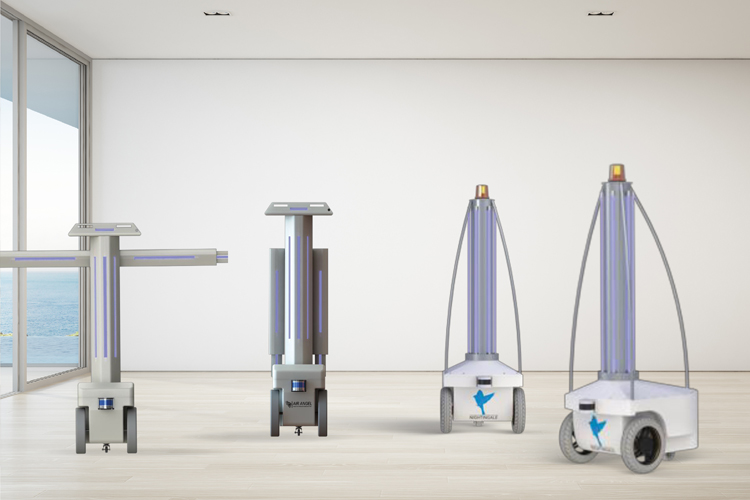Water
purification
UV Sanitization
UV SANITIZATION
Ultraviolet radiation (UV) has a well-known antiviral effect. A strong germicidal effect is provided by the Light in the short-wave UVC band.
To slow the increasing global spread of the Covid-19 virus, appropriate disinfection techniques are required.
UVC purification has a long and honorable history in cleaning room air. Good results are obtained with this form of purification because air has a low absorption coefficient and hence allows UVC to attack micro-organisms present.

Why we should use UV Sanitization:
This approach is chemical-free and highly efficient at disinfecting surfaces against harmful microorganisms.
The UVC disinfection ensures effectively combats microorganisms and destroys their DNA, keeping the environment healthier and safer.
Ultraviolet treatment is a physical mechanism that inactivates microorganisms quickly and effectively. The new technique also proves its efficiency when bacteria and viruses on all high-touch areas such as tabletops, workstations, phones, armchairs, doors, cabinet handles, light switches, etc. are exposed to Ultraviolet light, they become inactive and incapable of reproducing.
The Main Application Areas


Municipal
drinking water

Municipal
waste water

Residential
drinking water

Water coolers
dispensers

Semiconductors
process water

Spas and
swimming pools

Cooling
towers

Fish ponds
and aquariums

Air
purification

Cooling
coils
NIGHTINGALE AUTONOMOUS DISINFECTION UNIT
Usage Of Nightingale Autonomous Disinfection Unit:
- Vulnerable to outbreaks of respiratory infection and older residents are at risk of severe disease.
- This technique employs the germicidal properties of ultraviolet-C (UVC).
- It has been utilized in the decontamination of water, air, and various surfaces.
- In the hospital setting, UVC systems are used to disinfect objects which cannot be immersed in liquid biocides as well as for disinfecting high-touch surfaces.

- Cleaning of holding areas, canteen areas, frequently touched surfaces.
- When social distancing measures breakdown in a busy environment, the risk of workforce transmission can increase.
- Regular use of NIGHTINGALE can reduce the risk of workplace transmission.

- Visitors and staff are the primary points of entry for infection into an establishment.
- This brings increased risk to the community.
- With so many surface points of contacts, it is extremely challenging to effectively deep clean on a daily basis.
- Regular use of NIGHTINGALE can reduce the risks of community transmission.

- Hospitality proves to be a difficult challenge for business both large and small.
- NIGHTINGALE can form part of COVID Work-safe Plan.
- Cleaning common areas, POS, bar areas and surfaces.

- Correction Facilities present a challenge regarding infection control.
- Inmates are near each other at certain times every day.
- Disinfecting visitor areas, staff rooms, food halls and common areas can reduce the risk of transmission.

- Educational Facilities present a challenge with infection control.
- Due to high volumes of students and difficulty maintaining social distancing, disinfecting classrooms, visitor areas, staff rooms, food halls and common areas can reduce the risk of transmission.


 (+971) 2 207 2333
|
صيانة
(+971) 2 207 2333
|
صيانة